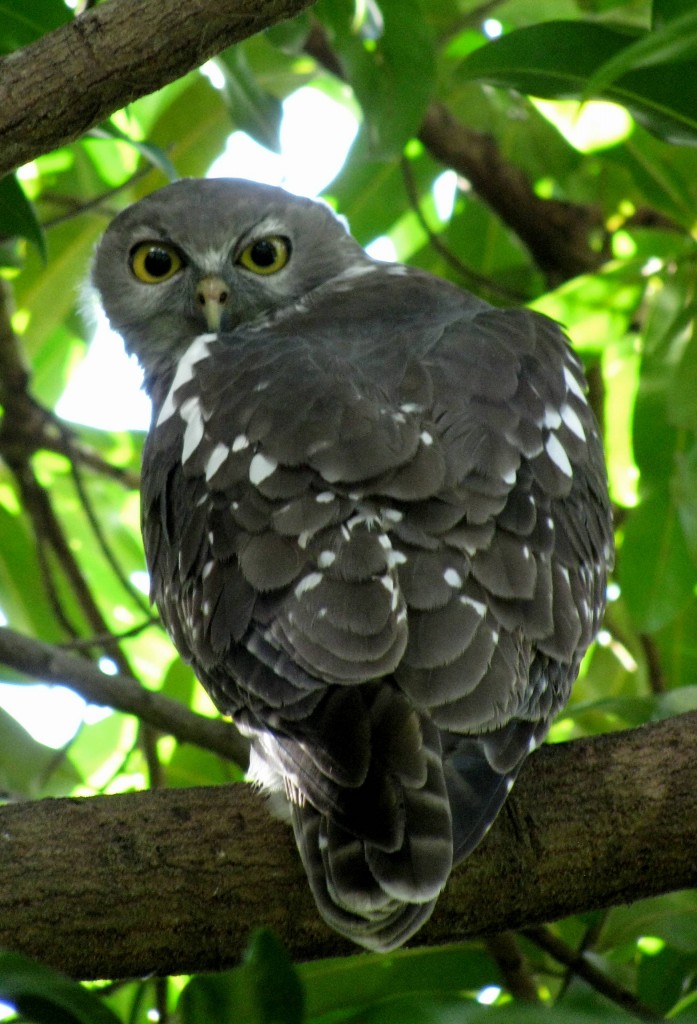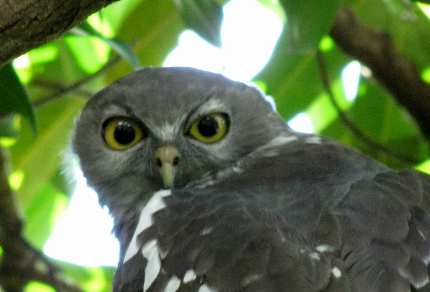
Barking Owl (© Magi Nams)
Ground fog hung like silver mist over the Townsville Golf Course at dawn, the rising sun a smear of gold above it. The air smelled and felt cool and damp, like summer’s end in Nova Scotia. Today, it is six months to the day since Vilis and I departed from that Canadian east-coast province, six months of life Down Under. Where has it brought us?
At last we have reached the much-longed-for season of winter in North Queensland’s Dry Tropics. Daily maximum temperatures reach 27°C, approximately equivalent to mid-summer temperatures in Nova Scotia. Nightly temperatures sink to the mid-teens. Most days are brilliantly sunny, a few offer the gift of cloud, and the rare one sends spitting drizzle down onto the drying tropical savannah woodland surrounding this city. A downpour in the night on June 4 was unexpected, drumming me awake with memories of the torrential rainfalls of the Wet.
With the end of the Wet now several months past, the hills surrounding Townsville have begun the slow march of drying toward that brown dusty landscape we encountered on our arrival on December 30. Within the city, irrigation and sprinklers maintain plantings, gardens, and lawns, although some of the latter, unwatered, now resemble shorn brown stubble on gravelly soil. The vast wetlands of the Bohle River floodplain protected within the Townsville Town Common Conservation Park are shrinking, exposing sand plains and mud flats decorated with the tracks of wildlife. As the dry season progresses, waterbirds will become concentrated in remaining wetlands, including the Common and Ross Lake.
I continue with my passion for birding, aided and abetted by Vilis, members of the Townsville Region Bird Observers Club, and even by Janis, who accompanied me to the Palmetum this morning in search of rufous and barking owls. We found a pair of both, inadvertently disturbing the big, rusty-brown rufous owls from their perches in a densely-foliaged tree. They flew only ten metres to new perches. The barking owls seemed completely unfazed by our presence. One of the pair in a small tree near the lily pond stared at us with wide, yellow eyes as it looked over its shoulder feathered in soft grey.
One day recently, I laughingly suggested to Vilis that I should try to identify the same number of Australian bird species as the number of our days in Australia, roughly a year. Last weekend, I learned that members of the TRBOC challenge themselves to see a bird for every day of the year. They’re allowed to store up sightings for future days. At least one birder already has birds up to October. I have 185 species to date, which puts me at July 2.
Since my last reflections in early May, we’ve explored more of North Queensland’s Wet Tropics (hiking at Wallaman Falls in Girringun National Park) and more of the Dry Tropics in the Townsville area (birding on the Common (mozzie season’s over), hiking at Herveys Range, Shelley Beach, and Alligator Creek.) Vilis and Janis enjoyed an amazing Western Australia adventure for three weeks, during which they assisted Dr. Euan Ritchie with biodiversity surveys on two enormous desert cattle stations. Through their photographs and anecdotes, I caught glimpses of the desert, too.
Our ears have grown accustomed to Australian accents, and for all we know, perhaps our accents have accumulated tinges of this Antipodean English dialect. It now seems perfectly normal to see palm trees growing in our yard and in native forests, and to observe vividly-hued parrots and lorikeets streaking across the sky. Our search image for mammals has abandoned leaping deer and chattering squirrels, instead cuing in to hopping macropods and nocturnal herbivores like possums or nectarivores like flying foxes. Our experiences lately have been heavily weighted toward the natural world and its wonders, but with a month of Townsville Festival approaching in July, we’ll even the scales somewhat by attending a range of cultural events.
In summary, the sheer adventure of living here is truly a gift, but I sometimes find myself longing for home. Nevertheless, this state, this country has so much to offer that I’ll gladly put those longings on hold until we abandon the heat and humidity of the tropical summer to return to a land caught in the grip of snow.


